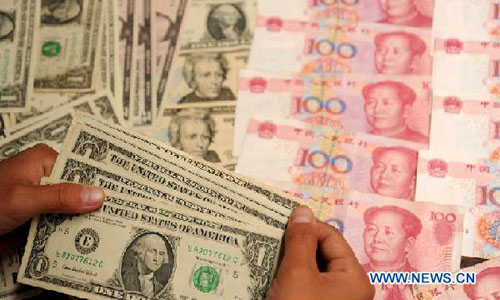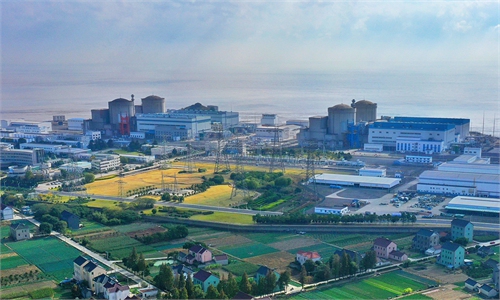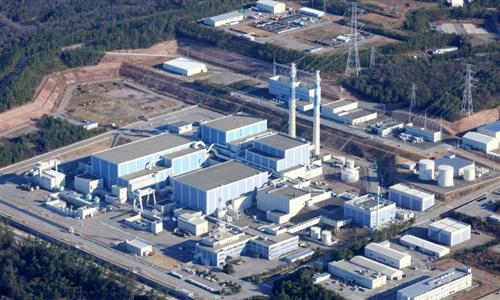China’s Dec forex reserves return to above $3.2 trillion, to help cope with external uncertainties
Reflects vibrant trade, offers buffer against uncertainty

A citizen counts the US dollars in Houma City, north China's Shanxi Province, Oct. 11, 2011. The Chinese currency renminbi, or the yuan, strengthened 103 basis points to a record high of 6.3483 against the US dollar on Tuesday, according to the China Foreign Exchange Trading system.Photo: Xinhua
Experts said the latest figures reflect the dynamics of China's indigenous growth drivers and the vibrancy of the country's foreign trade. The ample forex reserves will also enable the country to better respond to external uncertainties this year, further consolidating the momentum of recovery, experts said.
It was the second consecutive month that China's forex reserves rose, exceeding the 3.2 trillion mark again after five months.
Last year, China's foreign exchange reserves rose by $110.29 billion.
The SAFE attributed the increase to the comprehensive impact of exchange rate conversions and changes in asset prices. The prices of global financial assets increased versus a decline in the US Dollar Index in December.
In 2023, China's international balance of payments remained basically stable amid complex circumstances. Foreign exchange reserves stayed above $3.1 trillion throughout the year, according to the SAFE. The efficiency of foreign exchange management services for the real economy has continued to improve, and foreign exchange supervision has become more precise and effective, it said.
The SAFE said that China's continued economic recovery and high-quality development will provide solid support for the stability of the country's foreign exchange reserves.
"China's foreign exchange reserves are relatively abundant, which enables the country to better cope with the uncertainty of the external environment," Guan Tao, global chief economist at BOC International under the Bank of China, told the Global Times on Sunday.
The improvement of the domestic economy and an anticipated future reversal of the US Federal Reserve's tightening policy will support the stability of foreign exchange reserves in the future, Guan said.
The upward trend is within normal fluctuations. It indicated a stronger willingness of market participants to convert their currencies into the yuan and a preference to conduct their business transactions using the yuan, Dong Shaopeng, a senior research fellow at the Chongyang Institute for Financial Studies at the Renmin University of China, told the Global Times on Sunday.
The export growth momentum of electric vehicles, solar panels and lithium batteries, the continuous advancement of projects along the Belt and Road Initiative partner countries and the balance of international trade are all expected to contribute to the overall stability of China's foreign exchange reserves, Dong said.
China's gold reserves reached 71.87 million ounces by the end of December, marking the 14th consecutive month of increase.
China has been taking proactive moves to optimize and diversify its foreign reserves. Chinese holdings of US Treasury bonds fell further to $769.6 billion in October, the seventh consecutive monthly drop, according to data released by the US Department of the Treasury in December 2023.
Increasing gold holdings is necessary to diversify the structure of the country's foreign assets. China's gold holdings are still lower than the international level, meaning that there is still room for growth, Guan said.
In its 2024 foreign exchange management work conference held in Beijing from Thursday to Friday, the SAFE said that China will deepen reform and opening-up in the foreign exchange field to better serve the high-quality development of the real economy.
Efforts will be made to facilitate cross-border trade and investment, supporting technological innovation and small and medium-sized enterprises. It also pledged to keep the yuan exchange rate at a reasonable and balanced level, and maintain the basic balance of international payments.
The announcement of the foreign exchange data coincided with the release of several positive economic indicators. The China retail prosperity index, a barometer of retailers' expectations for the sector, expanded 0.5 points from the previous month, reaching 50.9 points in January, suggesting a strong recovery in the Chinese economy.
Despite the imbalanced global economic recovery and uncertainties in international financial markets, China's domestic demand potential is still significant, which will further buttress the country's forex reserves, Dong said.
"By stabilizing China's internal economic circulation while actively participating in the international market, China will play a crucial role in stabilizing the world economy in 2024," Dong added.



